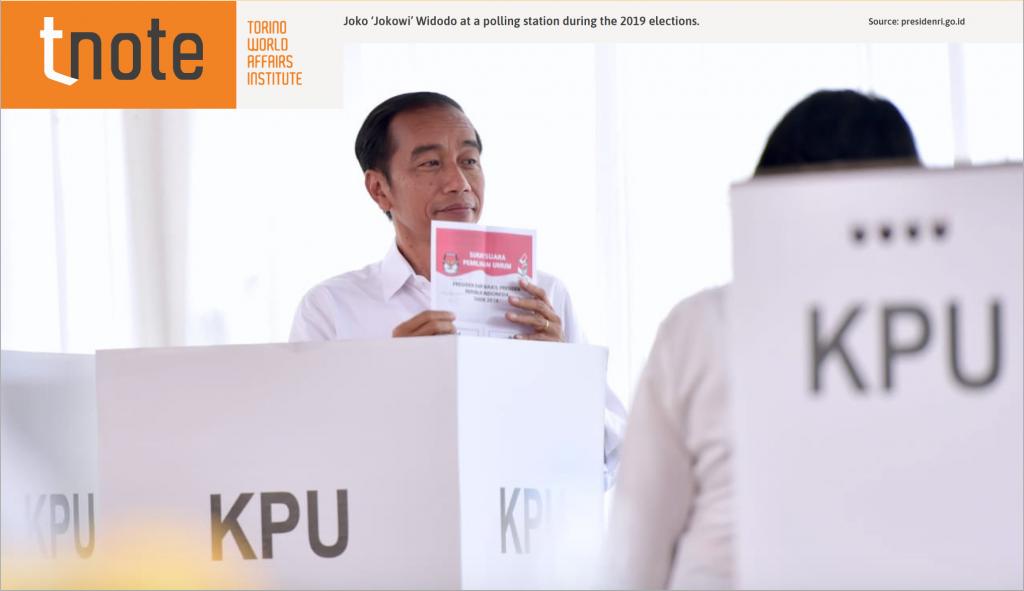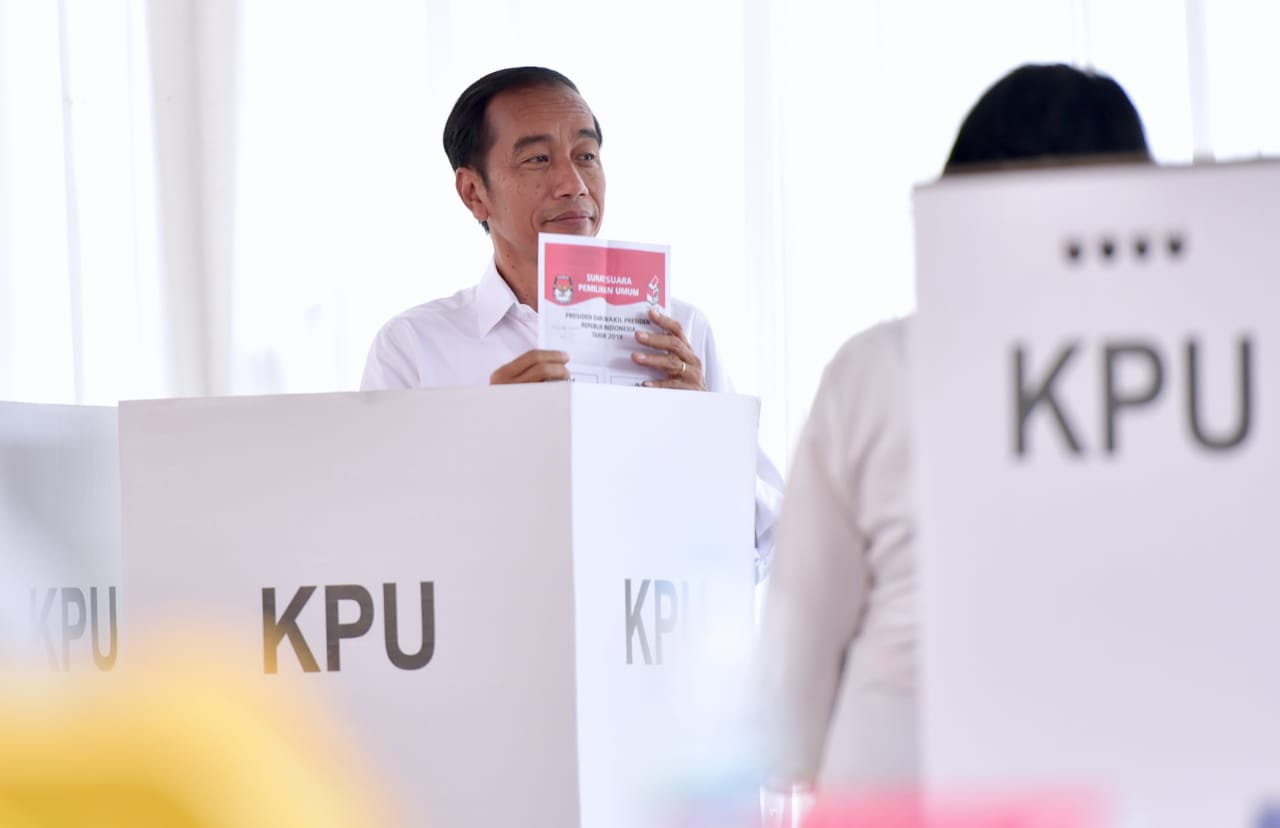
On 17thApril 2019, Indonesia’s young democracy brought almost 80% of its 192 million eligible citizens to the vote. On the same day, for the first time in the history of democratic elections in the country, the voters had to choose, from among more than 800,000 candidates, both their representatives in parliament and regional councils and their president until 2024. This mammoth electoral machine carried out its work but led to the death of thousands of scrutinizers (because of the enormous amount of work), and sparked street protests in Jakarta, which had not been seen since Suharto’s fall in 1998. This huge ‘experiment’, conducted in the context of a poisonous election campaign and characterized by the spread of too much fake news, concluded with the re-election of the incumbent president, Joko ‘Jokowi’ Widodo, thanks to a lead of ten percentage points on his old rival Prabowo Subianto.
The moderate technocrat Jokowi and the conservative ex-soldier Prabowo had already challenged each other, not without conflict, during the 2014 race for the presidency. These events laid the foundations for the divisive political clashes of the last nine months. Even though the first exit polls had already clearly revealed the victory of the outgoing President Jokowi, and the official tally at the end of May confirmed this result, the announcement of his victory was characterized by bitter disputes and fierce street clashes. Between 22ndand 23rd May, a large group of Prabowo supporters turned the Jakartan streets into a civil war scenario and nine of them died. The ambiguous attitude of the defeated candidate and the presence of former KOPASSUS members among the protesters were alarmingly reminiscent of the ‘New Order style’. Jokowi, on the one hand, expressed a great willingness for openness towards the opposition and, on the other, stated that he would not tolerate any kind of unrest. In this direction, the president, unexpectedly, but perfectly in line with Indonesian political tradition, has appointed his rival Prabowo as Defense Minister, affirming that in the archipelago opposition or contrast do not exist, rather there is ‘gotong royong’ (mutual help or assistance). Echoing Sukarno’s Guided Democracy tenets, this statement seems to realign Jokowi with traditional Javanese concept of power and, at the same time, confirm his capacity to keep tempers in check.
At least apparently, progressive Indonesians have another five years of work ahead, while Prabowo’s praetorian conservatism and radical Islam’s dreams of interference will have to wait for the next election. ‘Apparently’, because to win his second mandate Jokowi had to conceal his ‘too progressive tone’ and come to terms with the two main forces in the country: the Muslim majority represented by his deputy, Mar’uf Amin from Nahdlatul Ulama (NU), and, above all, the army. In fact, the choice of the new Cabinet revealed some of the consequence of this covenant while Prabawo’s role in the new government raises many questions for the future.
A look at the election results, province by province, sheds some light on the relationship between ethnicity and religion and also on Jokowi’s ability to win the trust of the minority elites. Adherents of Christian religions, Hindu Bali, or those following the heterodoxy of Islam have perceived in Jokowi a guarantee of tolerance in a country where Islamic law seems to be gaining ground every day despite the state’s secular nature. Besides this, Javanese Muslims and NU moderates have renewed their support for him. The success of Prabowo in areas with less tolerant Islam is alogical consequence of his bias towards extremism. The country overall, however, despite doubts about the great projects carried out by Jokowi, seems to have confirmed its support for the president mainly because of his tolerant attitude toward ethnic, linguistic and religious variety. Simultaneously, in the last nine months, the president has been trying to guarantee Muslims their centrality in the archipelago, for better or for worse.

Joko ‘Jokowi’ Widodo at a polling station during the 2019 elections. Source: presidenri.go.id
Jokowi’s main aim is to achieve infrastructural growth and a welfare state even at the cost of lesser attention to human rights, something he strongly focused on during the 2014 campaign. Certainly the ‘great expectations’ of Nawacita’s speech on this question remain outstanding. Capital punishment continues to be widelyapplied. Further investigations into the abductions and the repression of 1998 is non-existent, as is an analysis of the 1965 bloodbath. Similarly, other issues such as respect for minorities, particularly LGBT people, gender equality, and the recognition of ex-tapol (political prisoners) as state victims are still a long way from being resolved.It is not a coincidencethat last October, in his speech on the anniversary of the army, Jokowi claimed that the main aim of the military is fighting against communism, despite the hammer and sickle’s ideology having been banned in Indonesia since 1966. In this climate of tension, thanks to the broad dissemination of fake news, his statement seems obvious and legitimate, but it does not bode well for an eventual historical reconstruction.
In the same vein, and bringing old ghosts back to life, the new rules on military engagement in civil society are producing a variety of responses in the country. The fraught memories of the Suharto era underline what is at risk if the role of the army intensifies and democracy fails. This choice is not only directed at solving several management issues with redundant high-ranking officers; it also contains an unsettling omen for the young democracy. Jokowi has already put several military personnel in key roles, showing shrewd political acumen in facing Prabowo in his own field.
In the same way, after innumerable rumours about his religious integrity as a Muslim, sometimes linked with improbable allegations that he was born a communist, Jokowi has ostentatiously demonstrated pious Islam behaviour. Furthermore, the political pact he achieved with the largest Muslim party and the choice of its chairman as runningmate may represent a prudent move to retain power for another five years and, in the meantime, carry out the structural reforms that he haslonged for.
Notwithstanding his progressive and moderate appearance, Jokowi has sought allies among the oldest and strongest political forces in the archipelago. Most likely, without these alliances, he would have had all these powers against him, and he could not have gained the chance to lead the country again.Concessions to these forces, along with advances in the field of human rights and the welfare state, represent the real challenges for Jokowi’s second term. Furthermore, we cannot forget the complex relationship with Chinese investments in Indonesia, which have attracted sharp criticism from the opposition but which were deemed necessary by the president.
Actually, these are not really two polar opposites, but two different ways of dealing with Indonesian growth in the context of the country’s cultural traditions. Facing the increase in conservative Islam and the return of army interference, but at the same time embracing the importance of foreign investments within the international trade war, constitutes a necessary path nowadays in Indonesia. Jokowi has understood correctly how to navigate this intricate and diverse context. We have to wait to see whether during his second mandate the president will be able to reconcile the old great expectations of human rights with new, even greater expectations of economic, technological and welfare development.
Download

Corso Valdocco 2, 10122 Torino, Italy
Sede legale: Galleria S. Federico 16, 10121 Torino
Copyright © 2026. Torino World Affairs Institute All rights reserved
